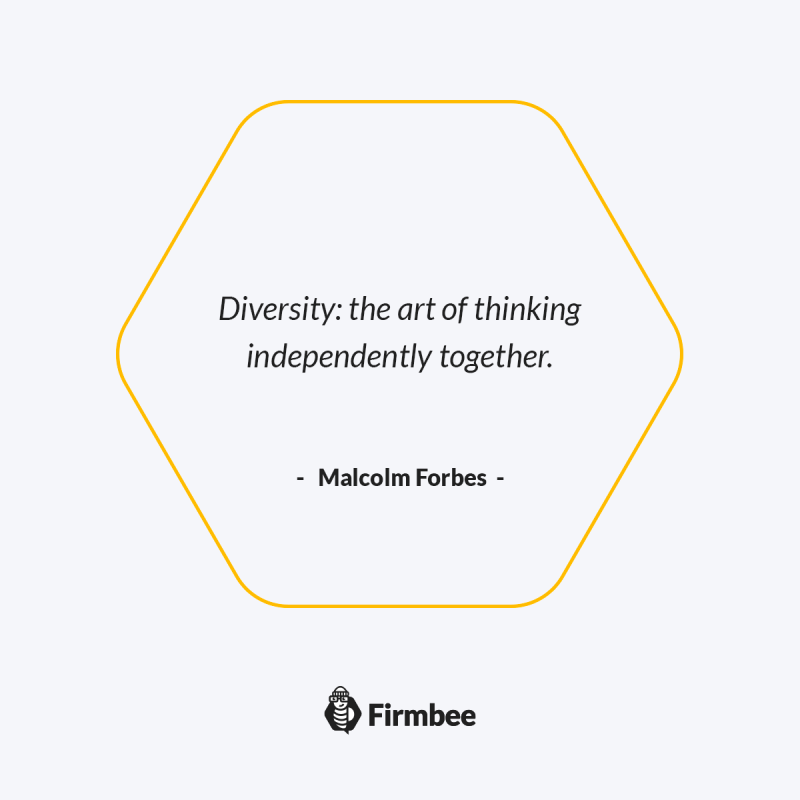Why is inclusion important in the workplace? Without the right inclusion practices in place companies have to deal with discrimination, unequal treatment and bias as well as with low productivity and lack of innovativeness.
How to promote inclusion in the workplace – table of content:
Why is inclusion important in the workplace?
Inclusion is an issue closely related to the question of diversity. Some of the companies confuse diversity with inclusion, inclusion with equality and so on. Those are not interchangeable terms, although all problems are usually discussed together. Diversity refers to the differences between individuals in the workplace related to their background or physical features such as: age, gender, race, or ethnicity, while inclusion refers to the set of practices, policies and norms assumed by the organization to make all the employed individuals feel heard, seen and valued in spite of their differences.
Inclusion means the strategies that help to make all working team members to feel safe and included. The diversity is the concept, while the inclusion is the practical execution of the ideal. The companies have to deal both with diversity issues (hire different people, encourage minorities to apply for jobs, create teams that are diverse ethnically and gender wise) as well as with inclusion procedures otherwise diversity may not bring any positive changes to the company.

Strategies to promote inclusion in the workplace
There are many ways to create an inclusive workplace. To make your office more inclusive you have to use strategies as follows:
Make your recruitment campaigns inclusive – inclusion starts before hiring. All your documents and publications have to be revised with diversity and inclusion in mind. Is your recruitment advert gender and ethnically neutral. Do you use appropriate language? Have you ever created job adverts that are focused on future tasks instead of achievements from the past? In your advert you have to state clearly that candidates of different age or walks of life are welcomed. Consider usage of bias-free recruitment software that enables inclusive job description creative and well as helps with the analysis of applicants which is based on merit and data-driven.
Provide training during onboarding – there is a lot of training provided by the employer during the onboarding process. It is advisable to make diversity and inclusion training a part of that process. When all the employees go through the same training program and learn about the same inclusion policies there is a chance that culture of inclusion and ethics will be implemented successfully throughout the whole organization. In most of the cases, because of the training, employees may be held accountable in case of any deviation from the company rules.
Create inclusion habits – employees usually wish to be more fair and they generally feel better when they know how to support equality in their environment. Put your money where your mouth is and provide your employees with inclusion coaching programs. No significant change can be done overnight. One time training may be sufficient in some situations, but coaching may give your employees much broader perspective and let them learn new skills.
Make all meetings more inclusive – for better communication include more parties in your meetings. Invite all individuals that may have something to say about the subject, don’t restrict your list to the managers or specialist, allow employees that are younger or less experienced to present their view. Let your employees to be heard and avoid biased outlook that some individuals may not provide equally beneficial insight. Allow mutual learning and improve communication – employees that feel seen are more likely to work harder to achieve goals of the company.
Educate leaders and managers – the company should have policies and procedures for inclusion and all important individuals in the company have to be aware of them, moreover managers, specialist and supervisors have to be trained to react accordingly to those regulations. Company leaders make all important decisions in the company, hence inclusion should be their highest priority, they need to understand how beneficial for the company is the culture of inclusion.
Supervisors don’t always have to state their beliefs, but they have to be able to lead by example. Different leadership styles influence inclusion in the workplace, and even small changes at the top level may make a huge difference for common employees. Training and educating all the managers ensures that lower-level employees have a place to go in case of problems and difficulties related to diversity.
Allow reporting of discrimination – all non-inclusive activities, the same as discriminatory policies and procedures have to be initially spotted to be corrected and changed. Allow your employees to communicate openly about such issues and take more proactive approach to eradicate negative behavior. Try to set up an on-line tool for reporting of such incidents as: harassment or discrimination, where employees could leave their comments without being forced to talk to the managers employed at the highest level.

Summary
An inclusive workplace make every employee feel respected and valued and this is why inclusion is important in the workplace. There are differences between individuals and this fact has to be acknowledged. We cannot change the reality, where diversity of forms prevails. Without the right inclusion practices in place companies have to deal with discrimination, unequal treatment and bias as well as with low productivity and lack of innovativeness. It is better to apply best practices and tools to promote inclusion and diversity instead of paying the cost of low business outcomes and high turnover.
Read also: A link between diversity management and equal employment opportunity in the workplace
If you like our content, join our busy bees community on Facebook, Twitter, LinkedIn, Instagram, YouTube.
Author: Nicole Mankin
HR manager with an excellent ability to build a positive atmosphere and create a valuable environment for employees. She loves to see the potential of talented people and mobilize them to develop.


















